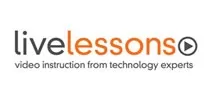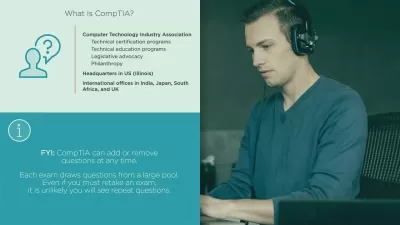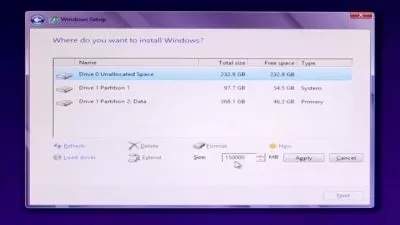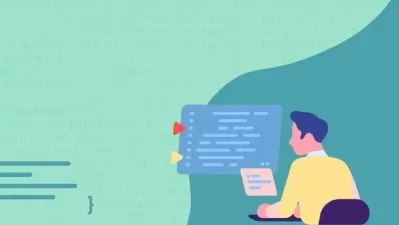CompTIA A+ Core 2 (220-1102) Complete Video Course
Focused View
29:56:09
174 View
001. CompTIA A+ Core 2 (220-1102) Complete Video Course (Video Training) Introduction.mp4
05:13
001. Learning objectives.mp4
00:45
002. 1.1 Types of Workstation Operating Systems.mp4
23:52
003. 1.2 32-bit versus 64-bit.mp4
08:04
004. 1.3 Smartphone & Tablet Operating Systems.mp4
19:38
005. 1.4 Vendor Life-Cycle Limitations.mp4
04:24
001. Learning objectives.mp4
00:26
002. 2.1 Comparison of Windows Versions and Features.mp4
04:15
003. 2.2 Corporate versus Personal Needs.mp4
10:40
004. 2.3 Application Requirements and Install Methods.mp4
07:55
001. Learning objectives.mp4
00:26
002. 3.1 Installation Methods.mp4
06:42
003. 3.2 Types of Installations.mp4
17:15
004. 3.3 InstallUpgrade Considerations.mp4
10:32
005. 3.4 Partitioning.mp4
17:34
006. 3.5 File Systems & Formatting.mp4
08:24
001. Learning objectives.mp4
00:53
002. 4.1 Introduction to Microsoft Command-Line Tools and Help.mp4
14:48
003. 4.2 Challenge 4 Access Microsoft Command-line Tools.mp4
15:41
004. 4.3 File-related Commands Part 1.mp4
12:38
005. 4.4 File-related Commands Part 2.mp4
12:52
006. 4.5 Disk and File Checking Tools.mp4
13:56
007. 4.6 Working with Tasks.mp4
04:31
008. 4.7 Command-Line Networking in Windows Part 1 (ipconfig and ping).mp4
21:42
009. 4.8 Command-Line Networking in Windows Part 2.mp4
21:38
010. 4.9 Winver, Hostname, and Pathping.mp4
06:43
011. 4.10 Policy-based Commands.mp4
04:03
012. 4.11 Additional Command-Line Tools.mp4
02:34
001. Learning objectives.mp4
00:49
002. 5.1 Administrative Tools Part 1 (Computer Management and the MMC).mp4
16:50
003. 5.2 Administrative Tools Part 2 (Performance Monitor and WMD).mp4
16:56
004. 5.3 Administrative Tools Part 3 (Task Scheduler and Print Management).mp4
14:04
005. 5.4 Administrative Tools Part 4 (Local Users and Groups and Event Viewer).mp4
16:50
006. 5.5 Administrative Tools Part 5 (Windows Firewall and Local Security Policy).mp4
09:18
007. 5.6 Additional Windows Tools.mp4
10:18
008. 5.7 System Configuration Utility.mp4
08:46
009. 5.8 Task Manager.mp4
10:55
010. 5.9 Disk Management.mp4
16:06
001. Learning objectives.mp4
00:31
002. 6.1 Internet Options.mp4
09:33
003. 6.2 Display Resolution.mp4
06:03
004. 6.3 FolderFile Explorer Options.mp4
11:03
005. 6.4 System Properties.mp4
11:21
006. 6.5 Power Options.mp4
06:43
007. 6.6 Additional CP Icons (Part 1 - Windows 10).mp4
12:37
008. 6.7 Additional CP Icons (Part 2 - Windows 11).mp4
07:42
001. Learning objectives.mp4
00:44
002. 7.1 How to Access Windows Settings.mp4
08:15
003. 7.2 Time & Language.mp4
06:12
004. 7.3 Update & Security.mp4
08:42
005. 7.4 Personalization and Apps.mp4
10:12
006. 7.5 Privacy.mp4
08:39
007. 7.6 System Video, Power, Storage, and Remote Desktop.mp4
09:51
008. 7.7 System About and System Properties.mp4
04:48
009. 7.8 Virtual Memory.mp4
07:15
010. 7.9 Devices.mp4
05:01
011. 7.10 Network & Internet.mp4
03:38
012. 7.11 Accounts.mp4
04:37
001. Learning objectives.mp4
00:40
002. 8.1 Introduction to Windows Networking.mp4
14:43
003. 8.2 Static Vs. Dynamic IP.mp4
06:16
004. 8.3 Workgroup Vs. Domain.mp4
11:16
005. 8.4 Sharing and Mapping.mp4
15:19
006. 8.5 Administrative and Hidden Shares.mp4
17:36
007. 8.6 Establishing Network Connections.mp4
05:50
008. 8.7 Proxy Settings.mp4
07:38
009. 8.8 Remote Control of Windows Systems.mp4
12:59
010. 8.9 Firewall Settings.mp4
09:48
001. Learning objectives.mp4
00:24
002. 9.1 Apple ID.mp4
02:10
003. 9.2 macOS Tools and Best Practices.mp4
09:13
004. 9.3 Apple File Types for Applications.mp4
04:34
001. Learning objectives.mp4
00:44
002. 10.1 Introduction to Linux.mp4
11:00
003. 10.2 The Terminal.mp4
08:03
004. 10.3 Basic Linux Commands and Help System.mp4
11:01
005. 10.4 Working with Directories and Files Part 1.mp4
11:26
006. 10.5 Working with Directories and Files Part 2.mp4
18:36
007. 10.6 Administrative Access in Linux.mp4
11:25
008. 10.7 Linux Analysis.mp4
17:04
009. 10.8 Using Text Editors.mp4
08:25
010. 10.9 Linux Networking.mp4
06:41
011. 10.10 Linux Best Practices.mp4
11:54
012. 10.11 Challenge 5 Use Linux Commands.mp4
19:55
001. Learning objectives.mp4
00:37
002. 11.1 Physical Security.mp4
15:36
003. 11.2 Active Directory.mp4
23:46
004. 11.3 User Authentication.mp4
04:00
005. 11.4 Firewall Security.mp4
14:48
006. 11.5 MDM Policies and DLP.mp4
05:01
007. 11.6 Certificates and Trust.mp4
17:19
008. 11.7 Principle of Least Privilege.mp4
03:57
009. 11.8 Hard vs. Soft Tokens.mp4
02:25
010. 11.9 Authenticator Apps and SMS Security.mp4
05:16
001. Learning objectives.mp4
00:24
002. 12.1 Wireless Encryption Protocols.mp4
06:53
003. 12.2 Wireless Authentication (Enterprise).mp4
05:58
004. 12.3 Kerberos.mp4
05:48
001. Learning objectives.mp4
00:29
002. 13.1 Malware Part 1.mp4
09:57
003. 13.2 Malware Part 2.mp4
09:09
004. 13.3 Keyloggers.mp4
05:28
005. 13.4 Cryptominers.mp4
03:02
006. 13.5 Tools and Methods for Defeating Malware.mp4
12:51
001. Learning objectives.mp4
00:38
002. 14.1 Social Engineering Part 1.mp4
05:41
003. 14.2 Social Engineering Part 2.mp4
07:35
004. 14.3 Attacks on Passwords.mp4
11:32
005. 14.4 DoS, DDoS, Botnets, and Zero-day Attacks.mp4
08:13
006. 14.5 Additional Threats.mp4
05:48
001. Learning objectives.mp4
00:30
002. 15.1 Login OS Options.mp4
09:09
003. 15.2 Users and Groups.mp4
14:03
004. 15.4 BitLocker and EFS.mp4
13:25
005. 15.5 Windows Defender Antivirus.mp4
06:45
006. 15.6 Windows Defender Firewall.mp4
06:47
001. Learning objectives.mp4
00:26
002. 16.1 Password Best Practices.mp4
07:48
003. 16.2 Account Management.mp4
11:27
004. 16.3 Basic Active Directory Functions.mp4
19:10
005. 16.4 Disabling AutoPlayAutorun.mp4
05:36
001. Learning objectives.mp4
00:30
002. 17.1 Screen Locks.mp4
09:50
003. 17.2 Best Practices in the Case of Loss or Theft.mp4
05:53
004. 17.3 Additional Mobile Device Security.mp4
17:43
005. 17.4 Internet of Things (IoT).mp4
04:53
001. Learning objectives.mp4
00:23
002. 18.1 Recycling & Repurposing Best Practices.mp4
06:34
003. 18.2 Physical Destruction.mp4
07:59
001. Learning objectives.mp4
00:23
002. 19.1 SOHO Wireless Security Part 1.mp4
15:14
003. 19.2 SOHO Wireless Security Part 2.mp4
16:58
004. 19.3 SOHO Wireless Security Part 3.mp4
22:15
001. Learning objectives.mp4
00:44
002. 20.1 Browser DownloadInstallation.mp4
09:04
003. 20.2 Browser Settings.mp4
07:12
004. 20.3 Extensions and Plug-ins.mp4
05:04
005. 20.4 Password Managers.mp4
04:33
006. 20.5 Secure Connections.mp4
10:15
007. 20.6 More Browser Settings.mp4
16:46
001. Learning objectives.mp4
00:43
002. 21.1 Troubleshooting Windows Operating System Failures Part 1.mp4
12:08
003. 21.2 Troubleshooting Windows Operating System Failures Part 2.mp4
09:39
004. 21.3 Troubleshooting Windows Operating System Failures Part 3.mp4
30:00
005. 21.4 Windows 10 Recovery Environment.mp4
21:35
006. 21.5 Service Failures.mp4
18:39
007. 21.6 Performance and Application Issues.mp4
23:36
008. 21.7 Windows Troubleshooting Utilities Part 1.mp4
15:12
009. 21.8 Windows Troubleshooting Utilities Part 2.mp4
08:48
001. Learning objectives.mp4
00:30
002. 22.1 Common Symptoms and Potential Culprits Part 1.mp4
17:50
003. 22.2 Common Symptoms and Potential Culprits Part 2.mp4
13:07
004. 22.3 Invalid Certificate Issues.mp4
10:27
005. 22.4 Tools Used to Solve Security Problems.mp4
04:03
001. Learning objectives.mp4
00:29
002. 23.1 Malware Removal Procedure.mp4
08:49
003. 23.2 Scenario - Scan For and Quarantine a Virus.mp4
07:41
001. Learning objectives.mp4
00:25
002. 24.1 Common Symptoms of Mobile OSApp Issues.mp4
10:09
003. 24.2 Troubleshooting Android and iOS.mp4
14:56
001. Learning objectives.mp4
00:28
002. 25.1 Mobile OS Security Issues - Symptoms and Concerns.mp4
05:59
003. 25.2 Tools Used to Solve Mobile OS Security Problems.mp4
05:19
001. Learning objectives.mp4
00:23
002. 26.1 Ticketing Systems.mp4
05:58
003. 26.2 Asset Management.mp4
02:41
004. 26.3 Types of Documents.mp4
07:52
005. 26.4 Network Documentation.mp4
12:01
006. 26.5 Knowledge Bases and Articles.mp4
09:49
001. Learning objectives.mp4
00:22
002. 27.1 Change Management Best Practices Part 1.mp4
10:21
003. 27.2 Change Management Best Practices Part 2.mp4
02:49
001. Learning objectives.mp4
00:28
002. 28.1 Power Problems and Protective Devices.mp4
14:09
003. 28.2 Backup Methods and Testing.mp4
12:47
004. 28.3 Backup Demonstrations.mp4
12:00
005. 28.4 Account Recovery Options.mp4
10:59
001. Learning objectives.mp4
00:25
002. 29.1 ESD Prevention.mp4
05:06
003. 29.2 Equipment Grounding.mp4
06:37
004. 29.3 Personal Safety.mp4
11:26
001. Learning objectives.mp4
00:21
002. 30.1 MSDS Documentation.mp4
05:11
003. 30.2 Toxic Waste Handling.mp4
05:39
004. 30.3 Environmental Controls.mp4
06:12
001. Learning objectives.mp4
00:27
002. 31.1 Incident Response.mp4
08:00
003. 31.2 Licensing.mp4
04:57
004. 31.3 Regulated Data.mp4
12:08
001. Learning objectives.mp4
00:22
002. 32.1 Communication Techniques.mp4
05:17
003. 32.2 Professionalism.mp4
07:29
001. Learning objectives.mp4
00:44
002. 33.1 Introduction to Scripting.mp4
11:30
003. 33.2 Challenge 6 Use PowerShell and VSC.mp4
18:44
004. 33.3 Scripting in PowerShell.mp4
14:36
005. 33.4 Challenge 7 Linux, Nano, Vim, and Bash.mp4
18:14
001. Learning objectives.mp4
00:23
002. 34.1 RDP.mp4
11:11
003. 34.2 SSH.mp4
11:09
001. Learning objectives.mp4
00:44
002. 35.1 Test Taking Tips & Techniques.mp4
06:10
003. 35.2 Sample A+ Question 1 (220-1102).mp4
10:34
004. 35.3 Sample A+ Question 2 (220-1102).mp4
06:03
005. 35.4 Sample A+ Question 3 (220-1102).mp4
10:18
001. Learning objectives.mp4
00:59
001. Module 2 Introduction.mp4
01:07
001. Module 3 Introduction.mp4
01:07
001. Module 4 Introduction.mp4
01:39
001. CompTIA A+ Core 2 (220-1102) Complete Video Course (Video Training) Summary.mp4
01:36
More details
User Reviews
Rating
average 0
Focused display
Category

LiveLessons
View courses LiveLessonsPearson's video training library is an indispensable learning tool for today's competitive job market. Having essential technology training and certifications can open doors for career advancement and life enrichment. We take learning personally. We've published hundreds of up-to-date videos on wide variety of key topics for Professionals and IT Certification candidates. Now you can learn from renowned industry experts from anywhere in the world, without leaving home.
- language english
- Training sessions 210
- duration 29:56:09
- Release Date 2023/03/28









